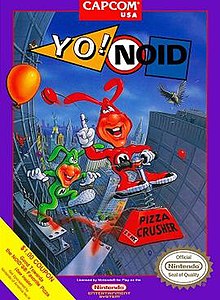Yo! Noid
| Yo! Noid | |
|---|---|
 North American cover art | |
| Developer(s) | Now Production |
| Publisher(s) | Capcom |
| Platform(s) | NES, PlayChoice-10 |
| Release | |
| Genre(s) | Platform |
| Mode(s) | Single-player |
Yo! Noid, known in Japan as Kamen no Ninja Hanamaru (仮面の忍者 花丸, Kamen no ninja Hanamaru, lit. "Masked Ninja Hanamaru"), is a 2D action platform game developed by Now Production and published by Capcom for the Nintendo Entertainment System. The game was first released in Japan on March 16, 1990 and was localized in the United States to promote the Noid, the mascot of Domino's Pizza. The game is also released as part of Nintendo's PlayChoice-10 series and featured in the Japanese TV show GameCenter CX.[2]
Plot[]
In Yo! Noid, wild creatures led by Mr. Green are running amok around New York City. As they cause havoc, the Mayor of New York decides to call upon the Noid to stop his evil duplicate, save everyone, and give him a massive pizza reward.[3]
Gameplay[]

Both games use the modified engine of Wagan Land and shared the same gameplay. Hanamaru/Noid has no life meter, and loses a life by either making contact with an enemy or running out of time before completing a level. For offense, both characters use different weapons (a Hawk for Hanamaru and a yo-yo for Noid) but they can gather magic points by collecting scrolls and use them for screen-clearing special attacks or very rare power-ups, both kinds of which are found in large scrolls opened with their weapons. Extra lives are awarded for every 20,000 points scored. Most levels are traveled on foot, but some exception in levels varies which includes a skateboard and an autogyro (in Hanamaru, Hanamaru uses his hawk companion for flight). Minigames vary for each version. In Hanamaru, for example, the player whacks penguins in one stage while Yo! Noid uses a "Pizza Crusher" level, as seen on the "Avoid the Noid" commercials. Boss battles in Hanamaru utilize a card-based system while Yo! Noid focuses on Pizza-eating contests.
Exclusive to the Yo! Noid version, the back cover of the instruction manual included a $1 Domino's Pizza coupon.
Development[]

Kamen no Ninja Hanamaru was first released in Japan on March 16, 1990. During the game's development on localizing the game, Capcom teamed up with Domino's Pizza to promote the company's mascot, changing a lot of graphics, sound and presentation. However, none of the game mechanics were changed. The localized game was released in the rest of the world as Yo! Noid in November 1990. In the process, the game gained coherence in locations but lost it in plot and character design. Most of the game's music was re-used for Yo! Noid, though a few tunes were changed. A few new tracks were written for the latter to reflect a more American atmosphere. Before Kamen no Ninja Hanamaru got released, the Wagan Land engine was used as a base for the game itself. And Namco Bandai Games now published the Wagan Land series while Capcom published both Hanamaru and Yo! Noid.
Legacy[]
On August 1, 2017, a fan-made sequel titled Yo! Noid 2: Enter the Void was released digitally as freeware. Originally developed as part of the New Jam City 2017 game jam,[4] the game features elements from fifth-generation console platform games. On July 1st, 2018, a "Game of a Year Edition" was released that adds a new "Remaster Mode" which removes the '90s-style video filter and makes the game run at 60 frames per second in high definition. It also adds four new unlockable characters, as well as a new pause menu.
References[]
- ^ Jump up to: a b "Release dates". GameFAQs. Retrieved 2008-11-13.
- ^ GameCenter CX Episode 58, Fuji TV
- ^ "Game summary". MobyGames. Retrieved 2008-11-13.
- ^ "Yo! Noid Was Ahead of its Time". Retrieved 2017-08-07.
- 1990 video games
- Advergames
- Works based on advertisements
- Capcom games
- Domino's Pizza
- Video games about ninja
- Nintendo Entertainment System games
- Now Production games
- PlayChoice-10 games
- Platform games
- Side-scrolling video games
- Video games about food and drink
- Video games developed in Japan
- Video games set in New York City
- Single-player video games